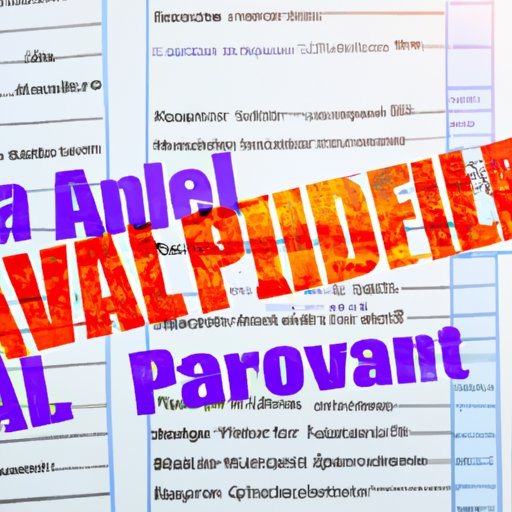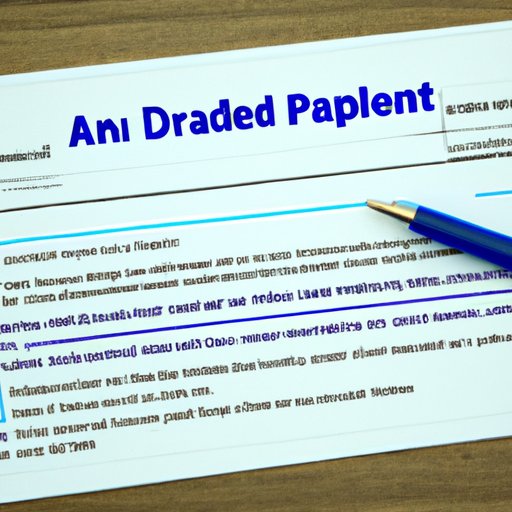Introduction
Advance parole is a form of immigration relief available to certain noncitizens who are in the United States. It allows individuals to travel outside the country and re-enter without having to obtain a visa. This guide will provide an overview of the benefits and requirements for obtaining advance parole, as well as step-by-step instructions for the application process.
Definition of Advance Parole
Advance parole is a document issued by U.S. Citizenship and Immigration Services (USCIS) that allows certain noncitizens in the United States to travel abroad and re-enter without having to obtain a visa. The document is valid for one year from the date it is issued, and can be renewed if necessary.

Overview of Benefits and Requirements
Advance parole is beneficial for those who are in the process of adjusting their status to become permanent residents of the United States. It allows them to travel abroad while their application is pending, and they do not need to obtain a visa to re-enter the country. It can also be used by those who are applying for asylum or refugee status, or who are applying for a green card based on employment or family sponsorship.
In order to qualify for advance parole, applicants must meet certain eligibility criteria. They must have a pending application for adjustment of status to permanent resident, asylum, or refugee status; or they must have an approved application for deferred action. Additionally, they must not have any criminal convictions or pending criminal charges.
Step-by-Step Guide to Obtaining Advance Parole
The process of obtaining advance parole is relatively simple. Here is a step-by-step guide to help you through the process:
Eligibility Requirements
Before applying for advance parole, you must make sure that you meet all of the eligibility requirements. As mentioned above, you must have a pending application for adjustment of status, asylum, or refugee status; or you must have an approved application for deferred action. You must also not have any criminal convictions or pending criminal charges.
How to Apply for Advance Parole
Once you have determined that you meet the eligibility requirements, you can begin the application process. The first step is to complete Form I-131, which is the application for advance parole. You will need to provide information about your current immigration status, your travel plans, and other relevant information. Once you have completed the form, you will need to submit it along with the required filing fees and supporting documents.
Documentation Needed for Application
In addition to Form I-131, you will need to submit certain documentation with your application. This includes proof of your current immigration status, such as a copy of your passport, visa, or green card. You will also need to provide evidence of your travel plans, such as airline tickets, hotel reservations, and itineraries. Finally, you may need to provide additional documentation depending on your particular situation. For example, if you are applying for advance parole due to an emergency, you may need to provide evidence of the emergency.
Benefits of Traveling With Advance Parole
Traveling with advance parole offers several benefits for noncitizens in the United States. First, it gives individuals the opportunity to re-enter the US after international travel without having to obtain a visa. This can be especially helpful for those who are in the process of adjusting their status and cannot obtain a visa. Second, it allows individuals to change their status while in the US. This means that instead of having to return to their home country to adjust their status, they can do so while in the US. This can save time and money, as well as reduce the risk of being denied entry into the US.
Restrictions of Advance Parole
Although advance parole offers many benefits, there are some restrictions to be aware of. First, individuals cannot use advance parole to adjust their status or enter the US on a different visa. In addition, advance parole is only valid for specific periods of time, typically up to one year. This means that those who are traveling with advance parole must return to the US within the allotted time or risk being denied entry.
Cost of Obtaining Advance Parole
The cost of obtaining advance parole varies depending on the individual’s situation. The filing fee for Form I-131 is currently $575, and the biometrics services fee is currently $85. In addition, individuals may need to pay for other expenses such as passport photos, copies of supporting documents, and postage.

Using Advance Parole for International Travel
If you are planning to travel internationally with advance parole, it is important to understand the travel requirements. Before leaving the US, you must notify USCIS of your travel plans. Additionally, you must provide proof of your identity, such as a valid passport, at the port of entry upon returning to the US. Finally, you must make sure that you return to the US within the period of validity of your advance parole document.

Process of Applying for Advance Parole
The process of applying for advance parole is relatively straightforward. The first step is to gather all of the necessary documents, such as a passport, visa, or green card. Next, you will need to complete Form I-131 and submit it along with the required filing fees and supporting documents. After submitting the application, you will receive a receipt notice from USCIS confirming that your application has been received. Finally, you will receive a decision from USCIS regarding your application.
Tips on Navigating the Advance Parole Process
When applying for advance parole, it is important to stay up-to-date on changes in immigration law. Additionally, it is recommended that those who are unfamiliar with the process contact an immigration attorney for assistance. Finally, it is essential to carefully follow all instructions when completing the application and submitting supporting documents.
Conclusion
Advance parole is a valuable form of immigration relief for those who are in the process of adjusting their status to become permanent residents of the United States. It allows individuals to travel abroad and re-enter without having to obtain a visa. The process of applying for advance parole is relatively straightforward, but it is important to stay up-to-date on changes in immigration law and carefully follow instructions. By understanding the benefits and requirements of advance parole, individuals can make the most of this form of immigration relief.
(Note: Is this article not meeting your expectations? Do you have knowledge or insights to share? Unlock new opportunities and expand your reach by joining our authors team. Click Registration to join us and share your expertise with our readers.)
